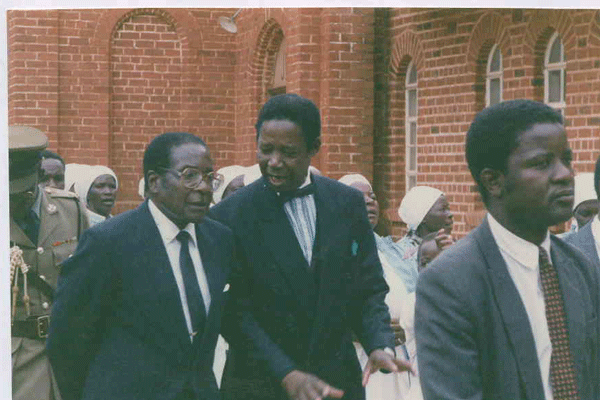
One of Zimbabwe’s widely respected authors and journalists — Lawrence Vambe — celebrated his 100th birthday on March 5 surrounded by family, friends and some of his many literary admirers.
By Trevor Grundy

I believe this great African might now be old, but his heart and his spirit remain young.
With a copy of a letter sent to him from Buckingham Palace, signed by Queen Elizabeth 11 who wished him a happy day on his 100th birthday, the internationally-acclaimed author, historian and journalist remains certain that his country has a great future despite the uncertainties that prevail at the moment.
“My people will come through their present ordeal and emerge stronger than ever before,” he said from his home in North London where he lives with his daughter, Elizabeth and son-in-law Stephen Pollock.
On the phone, he sounded more like a man in his 60s or 70s than one who had just turned 100.

The First World War was raging in Europe, a revolution that brought Lenin to power in Russia was approaching and non-whites were told to walk in the gutters of Salisbury when Europeans approached when Vambe was born at Chishawasha Mission on March 5 1917.
Friends and admirers of this great writer have been writing and saying how much his literary work has helped them understand Africa and Africans; how his time-tested integrity as a man and a writer has helped them remain true to themselves, their political beliefs and the hopes they all held for a country called Southeren Rhodesia when they were young.
- Chamisa under fire over US$120K donation
- Mavhunga puts DeMbare into Chibuku quarterfinals
- Pension funds bet on Cabora Bassa oilfields
- Councils defy govt fire tender directive
Keep Reading
“He has enriched our lives,” said his close friend and strong admirer, Judith Todd, the widely-respected daughter of the late Sir Garfield Todd and his wife, Lady Grace, who did so much to improve education for African children after their arrival in Southern Rhodesia from New Zealand in 1934.
“Lawrence is one of our greats,” said veteran journalist and author Pius Wakatama.
Doris Lessing went to her grave befriending and admiring Vambe and her foreword to the book An Ill-Fated People published in 1972 helped it turn into a seminal work.
The Nobel Prize winning author wrote: “It was painful reading this book. I hope it will be painful for other white people to read. I hope particularly that it will be read by the white-skinned British, who are responsible for the double dealing, the negligence and the cruelty, the atrocities described here.”
His second book From Rhodesia to Zimbabwe (1976) is regarded as one of the best primers for students of African history.
Vambe’s birth in 1917 witnessed the outbreak in Africa and Europe — later the whole world — of “Spanish” influenza, which claimed more lives than the whole of the 1914 to 1918 disaster.
His mother died soon after his birth and his father, close to a nervous breakdown, was unable to cope with family affairs.
Vambe was brought up by German nuns at the famous Roman Catholic-run Chishawasha Mission.
“Every morning, a novice nun would go and milk one of the cows and bring me fresh milk. Without her… well, I might not be alive today,” Vambe said.
And then a smile, a nod of the head and a laughter that all his friends and one-time colleagues in the Rhodesian press found infectious.
He went on to run the country’s main “black” newspapers during the days of white rule in large parts of Africa — working alongside top talents, men of the outstanding calibres of Nathan Shamuyarira, Stanlake Samkange, Herbert Chitepo and Kingsley Dube.
Later he was Southern Rhodesia’s press spokesman in London during the days of the Central African Federation. He went on to work as a public relations executive for Anglo American in London and Lusaka before returning home in the late 1970s.
In 1959, he was awarded the MBE by Queen Elizabeth 11 for his services to Commonwealth journalism.
In 1980, he was one of the founders of the Zimbabwe-Britain Society and throughout his long life, he was a devoted Catholic.
On the eve of his 100th birthday, Vambe did not wish to condemn the men and women running Zimbabwe. In his younger days he was a huge admirer of President Robert Mugabe, but he no longer likes him.
As always, he looks to the future and believes that one day things will improve for his countrymen and women.
“The torch is in the hands of our young people. I believe that they will one day understand the sacrifices that were made by the men and women of my generation. We don’t want thanks. It was our duty to fight the oppressors. Now it’s their turn and we all know that oppressors come in all sorts of shapes and sizes… all sorts of skin colours, too.”
Before his “big day”, I called him to tell him that he has a long, long time to go.
“Why?” he asked.
“Well,” I joked, “the Queen has sent you a congratulatory letter. We must have someone important here from Zimbabwe to send her a telegram when she reaches that age… nine years from now. So stick around Lawrence Vambe.”
Down the line, I heard him laugh — that still young sounding laugh that over the decades captivated so many people when they were young and when, as the song says about another time and another place — “our hearts were an open book.”
Trevor Grundy is a journalist and author of the books Memoir of a Fascist Childhood and Farmer at War.











